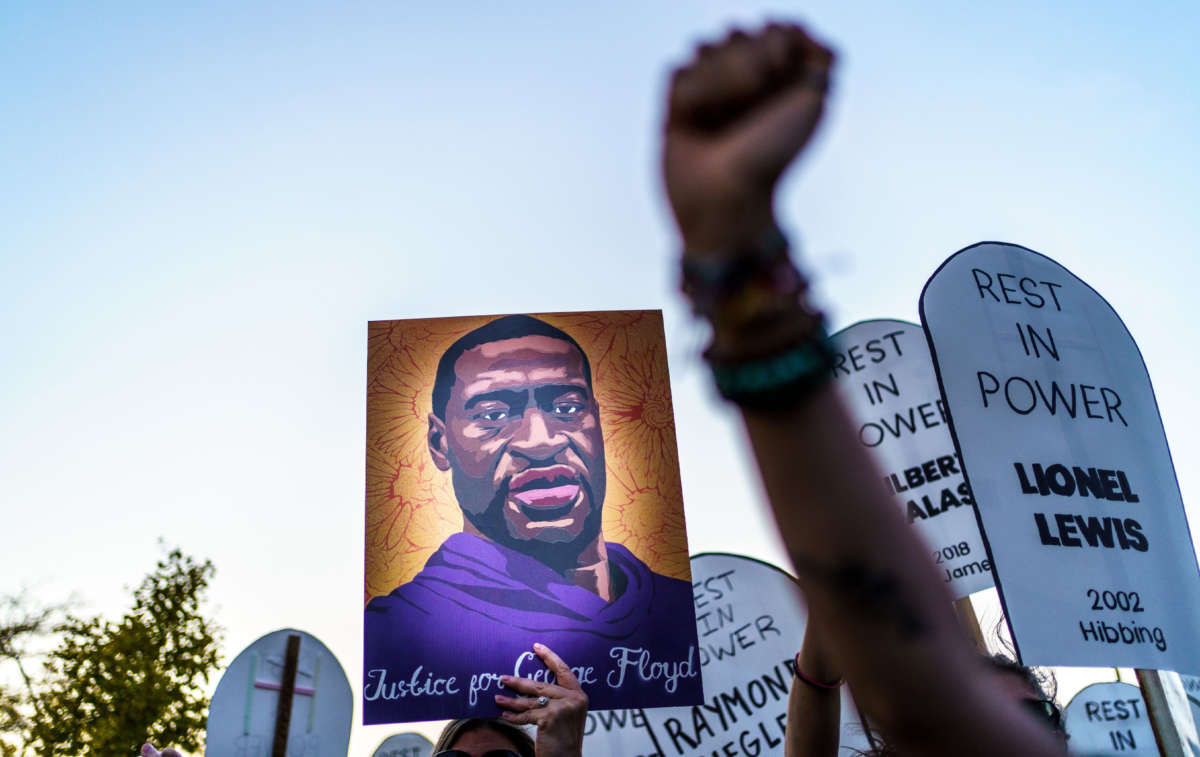Did you know that Truthout is a nonprofit and independently funded by readers like you? If you value what we do, please support our work with a donation.
Federal prosecutors in Minneapolis, Minnesota, have convened a grand jury to investigate former police officer Derek Chauvin, as part of a civil rights inquiry that began last summer after Chauvin killed George Floyd.
Chauvin and three other officers had arrested Floyd in late May. Chauvin, who is white, attempted to restrain Floyd, a Black man, during the event by placing his knee on Floyd’s neck to hold him down on the ground. Chauvin did not release his hold on Floyd’s neck despite pleas from Floyd that he could not breathe, and Floyd died as a result of that assault.
Footage of the arrest, captured on smartphone video, soon made its way to social media, where it prompted massive uprisings in Minneapolis and numerous other cities across the country, as many viewed the killing as being racially motivated.
Sources with knowledge of the recent grand jury proceedings say that witnesses were called to offer testimony regarding another similar incident from years prior involving the former officer. In 2017, Chauvin made an arrest of a 14-year-old boy where he also held his knee to the back of the child’s neck for several minutes, again refusing to let go despite the boy’s pleas to be released because he could not breathe. The boy survived that assault.
A state trial is set to begin in Minnesota on March 8. Evidence relating to Chauvin’s past assaults on individuals, including the one involving the 14-year-old, were deemed inadmissible by the judge in that trial, but its inclusion in the grand jury investigation by federal prosecutors could signal that it is being considered as part of the civil rights case against Chauvin.
Though the federal investigation is a civil rights matter, investigators are not pursuing the assumption that Floyd was killed by Chauvin because of his race. Rather, the investigation, started by the Department of Justice (DOJ) shortly after Floyd’s death last year, is looking into whether Floyd’s constitutional rights were willfully violated by the officers involved in the arrest that led to his death.
Some view the new actions being reported on by investigators as a sign that the Biden administration is renewing interest in the case. Benjamin Crump, a lawyer who is representing Floyd’s family, praised the actions of investigators in convening a grand jury.
“George Floyd’s death spurred a renewed and re-energized civil rights movement. It’s appropriate and gratifying that the Department of Justice under President Biden is taking racial justice seriously,” Crump said.
While federal investigators called the Floyd case last year a “top priority,” then-Attorney General William Barr said it was DOJ policy to allow “the state go forward with its proceedings first” before a federal inquiry could begin in earnest.
There are also new developments within the state trial, as a state court of appeals has agreed to hear arguments on whether additional charges against Chauvin should be considered.
The former officer is charged with two counts currently: second-degree murder and second-degree manslaughter. But Minnesota prosecutors have sought to include the lesser charge of third-degree murder in the trial for the jury to consider.
The difference between the two murder charges is noticeable, but could possibly allow a jury to decide which of the two charges is a better fit for Chauvin, if indeed they end up agreeing that he committed a murder that warrants a guilty verdict.
Second-degree murder in Minnesota law is charged when a person allegedly kills another but not in a premeditated way. It comes with a maximum penalty of 40 years.
Third-degree murder, meanwhile, which carries a maxiumum sentence of 25 years, happens when a person is found to have committed a crime in a way that was “evincing a depraved mind,” according to state statutes. It’s considered much more difficult to prove, as Washington County District Attorney Pete Orput explained in 2018.
A terrifying moment. We appeal for your support.
In the last weeks, we have witnessed an authoritarian assault on communities in Minnesota and across the nation.
The need for truthful, grassroots reporting is urgent at this cataclysmic historical moment. Yet, Trump-aligned billionaires and other allies have taken over many legacy media outlets — the culmination of a decades-long campaign to place control of the narrative into the hands of the political right.
We refuse to let Trump’s blatant propaganda machine go unchecked. Untethered to corporate ownership or advertisers, Truthout remains fearless in our reporting and our determination to use journalism as a tool for justice.
But we need your help just to fund our basic expenses. Over 80 percent of Truthout’s funding comes from small individual donations from our community of readers, and over a third of our total budget is supported by recurring monthly donors.
Truthout has launched a fundraiser to add 340 new monthly donors in the next 5 days. Whether you can make a small monthly donation or a larger one-time gift, Truthout only works with your support.
